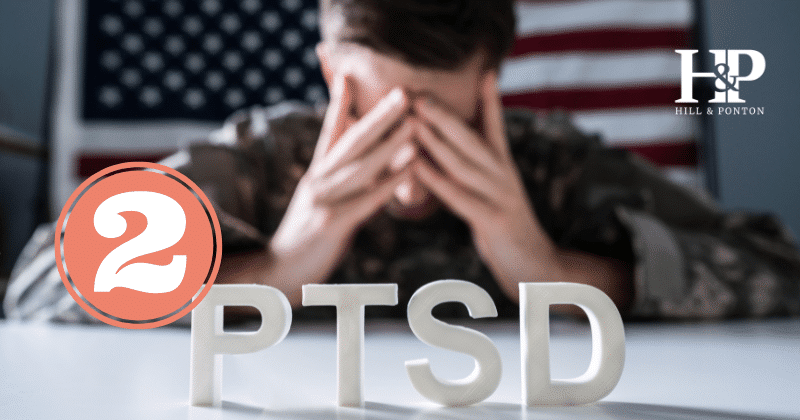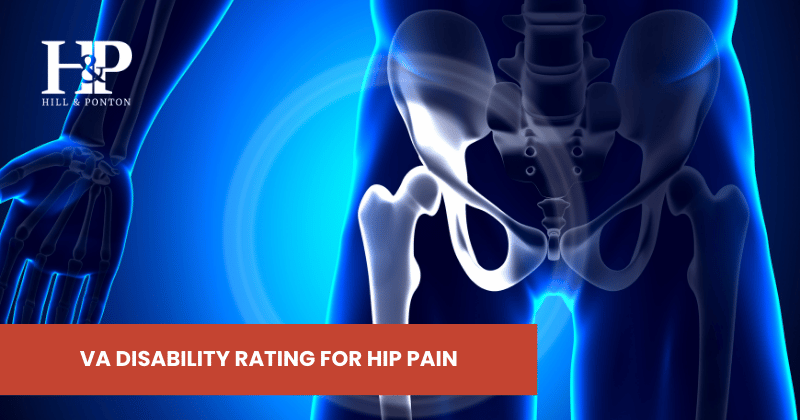For military veterans, Post-Traumatic Stress Disorder (PTSD) is more than just a diagnosis; it’s a life-altering condition often stemming from exposure to traumatic events during service. Beyond PTSD itself, secondary conditions frequently develop, amplifying the challenges veterans face daily.
This guide simplifies the process and highlights the steps veterans can take to advocate for their benefits effectively.
What Conditions are Secondary to PTSD?
Here are the most common secondary conditions and how to claim benefits for them.
Hypertension
High blood pressure is often worsened by the chronic stress of PTSD. The VA rates it from 10% to 60% depending on systolic and diastolic pressure.
VA Ratings for Hypertension Secondary to PTSD
- 60%: Diastolic pressure predominantly ≥130.
- 40%: Diastolic pressure predominantly ≥120 .
- 20%: Diastolic pressure predominantly ≥110 or systolic pressure predominantly ≥200.
- 10%: Diastolic pressure predominantly ≥100; or systolic pressure predominantly ≥160; or history of diastolic pressure predominantly ≥100 with continuous medication requirement.
Have questions about hypertension VA ratings? We’ve got answers here→
Sleep Apnea
Sleep apnea, a disorder marked by interrupted breathing during sleep, is connected to PTSD due to heightened stress, anxiety and interrupted sleep.
Types of Sleep Apnea:
- Obstructive Sleep Apnea: Throat muscles relax and block the airway.
- Central Sleep Apnea: Brain fails to signal breathing muscles.
- Complex Sleep Apnea: Combination of obstructive and central sleep apnea.
See the VA ratings for sleep apnea secondary to PTSD→
Migraines
Migraines are severe headaches often triggered by PTSD-related stress. Symptoms include severe pain, nausea, light/sound sensitivity, visual auras. Migraines are rated by the VA according to 38 CFR §4.124a, Diagnostic Code 8100.
Check out the VA ratings for migraines secondary to PTSD→
GERD
GERD, a digestive disorder involving acid reflux, is commonly linked to PTSD due to stress-induced stomach acid production.
Symptoms: Heartburn, regurgitation, difficulty swallowing, and chest pain. Veterans with GERD secondary to PTSD should provide medical evidence linking the two conditions.
Learn more about GERD secondary to PTSD here→
Mental Health Conditions and Pyramiding
While veterans may experience both PTSD and other mental health conditions, such as depression or anxiety, the VA prohibits assigning separate ratings for overlapping symptoms under its pyramiding rule. If a veteran’s symptoms from multiple conditions cannot be distinctly separated, the VA assigns a single disability rating. This ensures an accurate but not inflated overall disability rating.
Want to understand more about pyramiding and how it impacts you? Click here→
How to Make a Secondary Service Connection Claim
- Identify Your Secondary Conditions: Review symptoms and diagnoses linked to PTSD.
- Obtain a Diagnosis: Ensure all PTSD secondary conditions are diagnosed by a medical professional.
- Establish a Nexus: Provide medical evidence or opinions connecting the secondary condition to PTSD.
Can Secondary Conditions Help Veterans Get TDIU?
Veterans whose PTSD and related conditions prevent gainful employment may qualify for TDIU, allowing them to receive compensation at the 100% rate even if their combined rating is below 100%.
TDIU Requirements (38 CFR §4.16):
- One Service-Connected Condition: Rated at 60% or higher.
- Multiple Conditions: One rated at 40% or higher, with a combined rating of 70% or more.
Secondary condition ratings can contribute to meeting these thresholds.
Learn all you need to know about TDIU for PTSD here→
What Happens if My Secondary Service Connection Claim is Denied?
Denials can be frustrating, but you have options, including filing an appeal, gathering additional evidence (such as independent medical opinions or supporting statements) or even seeking out assistance with a Veterans Service Organization (VSO) or an accredited and nationally recognized veteran disability firm like Hill & Ponton, P.A.
Contact us today for a free case evaluation→
We’ve been proudly advocating for veterans since 1986, combining decades of experience with a singular focus on securing you and your loved ones the benefits you’ve earned. Join thousands of veterans across the country who trust Hill & Ponton PTSD lawyers to fight for their rights. Let us help you navigate the process and achieve the results you deserve.




